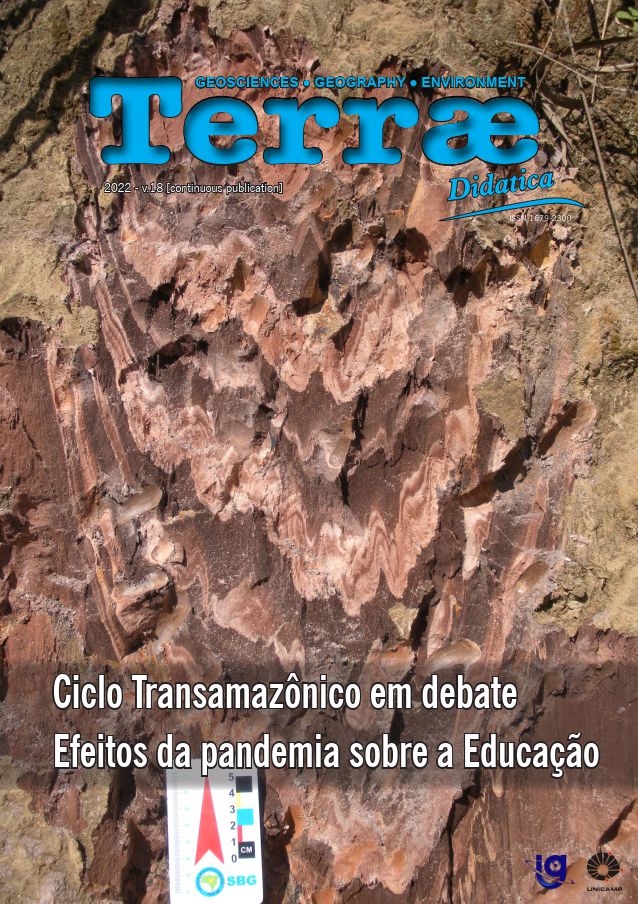Abstract
We went through 2021 focused on selecting and editing the 56 works that make up volume 17 of Terræ Didatica, with the hope that one day there will be greater control over the Covid-19 pandemic and its terrible effects, but the challenge of combating the virus will still demand efforts of researchers, authorities and the population. The magazine's pages were permeated by research results on the effects of the pandemic on geoscientific education, with an emphasis on innovative proposals that reveal the potential contribution of Earth Sciences to the collective effort to face the catastrophe. We've gathered examples along the year, as well as experimental results and remarkable evidence, that “human societies need to relearn how to relate to nature” (Presentation by Terræ Didatica, 2021). Seeds of innovation are planted when a researcher-educator contextualizes aspects of the local reality in order to work with his students on controversial issues about the relationship between human societies and nature. Before starting work in the classroom, however, it is necessary to broaden and reformulate points of view to problematize themes about the complex and intricate web-of-life on Earth. Each educator needs to train and deepen knowledge about environmental dynamics. The themes of Geoethics and Geoconservation inspire uninterrupted research, while case studies are accumulated on significant problems of environmental degradation that can be better understood based on the elementary – and extremely unequal – difficulties experienced by the communities.
- These are not new issues; these are themes that have been studied and debated for a long time. However, after the critical event of the pandemic, concepts related to the Earth's dynamics and the impacts of human interference in natural processes will emerge into the surface and may show that the current model of society is no longer effective; on the contrary, it is fragile and aggressive to terrestrial environments and ecosystems. Small good changes may come, and education will play an important role in changing paradigms.
References
Carneiro, C. D. R., Pereira, S. Y., Gonçalves, P. W., & Ricardi-Branco, F. S. T. (2021). O desafio da divulgação das Geociências em tempos de pandemia e movimentos anti-Ciência. (Apresentação). Terræ Didatica, 17(Publ. Contínua), e021001. doi: https://doi.org/10.20396/td.v17i00.8663971.
Dowbor, L. (2017). A era do capital improdutivo: Por que oito famílias tem mais riqueza do que a metade da população do mundo? São Paulo: Autonomia Literária. 320p. ISBN: 978-85-69536-11-6. Disponível em: https://dowbor.org/2017/11/2017-06-l-dowbor-a-era-do-capital-improdutivo-outras-palavras-autonomia-literaria-sao-paulo-2017-316-p-html.html. Acesso em: 19. dez. 2021.
Fórum Nacional de Pró-Reitores de Pesquisa e Pós-Graduação (2021). Nota Pública 05-2021. Brasília, Foprop. 24.09.2021. Disponível em: http://www.foprop.org.br/uploads/downloads/2021_09_24/NOTA-05_FOPROP_24_09_2021.pdf. Acesso em: 23 dez. 2021.
Huaillani-Chavez, S. D. R. (2019). Publica o perecerás: ¿ser coautor? Santa Clara: Edumecentro, 11(2). Disponível em: http://scielo.sld.cu/scielo.php?script=sci_arttext&pid=S2077-28742019000200192&lang=pt. Acesso em: 19 dez. 2021.
Petroianu, A. (2012). Critérios para autoria de um trabalho científico. DST-Jornal brasileiro de doenças sexualmente transmissíveis, 24(2), 99-103. Disponível em: http://ole.uff.br/wp-content/uploads/sites/303/2018/02/r24-2-2012-7_Criterios-para-Autoria-de-um-Trabalho-Cientifico.pdf. Acesso em: 23 dez. 2021.
Schneyer, J. (2013). Commodity Traders: the Trillion Dollars Club. Disponível em: http://dowbor.org/2013/09/joshua-schneyer-corrected-commodity-traders-the-trillion-dollar-club-setembro-201319p.html/ ou www.reuters.com/assets/print?aid=USTRE79R4S320111028.

This work is licensed under a Creative Commons Attribution-NonCommercial 4.0 International License.
Copyright (c) 2022 Terrae Didatica


